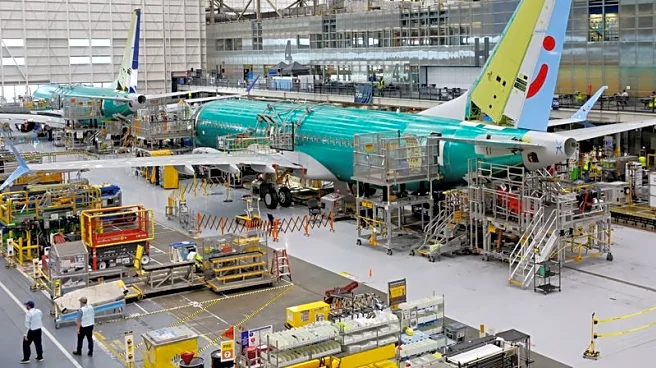What's Happening?
The Senate has advanced a new 31-page bill aimed at ending the ongoing government shutdown, marking a significant step towards resolving the record-setting stoppage. The bill, which was released on Sunday
evening, received a 60-40 vote, with eight Democratic caucus members joining Republicans to overcome the filibuster threshold. If passed, the bill will keep the government open until January 30 of next year, fund certain federal programs like the Agriculture Department for the entire year, and limit President Trump's ability to fire federal workers temporarily. The agreement also includes a promise from Senator Thune to hold a separate vote on healthcare before the end of the year. However, the lack of an immediate healthcare vote has drawn criticism from some Democrats, including Senator Bernie Sanders and House Minority Leader Hakeem Jeffries. The shutdown has led to significant travel disruptions, with over 1,000 flights canceled on Saturday and more than 2,000 on Sunday.
Why It's Important?
The advancement of the bill is crucial as it aims to end the government shutdown, which has caused widespread disruptions across various sectors. The shutdown has particularly impacted air travel, with thousands of flight cancellations over the weekend, highlighting the urgent need for resolution. Additionally, the Trump administration's directive to states to 'undo' the distribution of November SNAP benefits has raised concerns about food security for vulnerable populations. The bill's provisions to limit President Trump's ability to fire federal workers could stabilize the federal workforce during this period. The promise of a healthcare vote may also influence future negotiations and political dynamics, although the lack of immediate action on healthcare has sparked criticism from some Democratic leaders.
What's Next?
The bill is expected to move to the House of Representatives for further consideration. If passed, it will require President Trump's signature to become law, potentially ending the shutdown. The political path ahead may involve further negotiations, particularly regarding the promised healthcare vote. Economic impacts from the shutdown, such as travel disruptions and halted SNAP benefits, are likely to continue until a resolution is reached. Stakeholders, including political leaders and affected industries, will be closely monitoring developments as the situation unfolds.
Beyond the Headlines
The ongoing government shutdown and the proposed bill highlight deeper issues within U.S. political dynamics, including partisan divisions and the challenges of negotiating bipartisan agreements. The situation underscores the broader implications of government shutdowns on public services and economic stability. The controversy over SNAP benefits distribution raises ethical questions about food security and the government's role in supporting vulnerable populations during political impasses.










